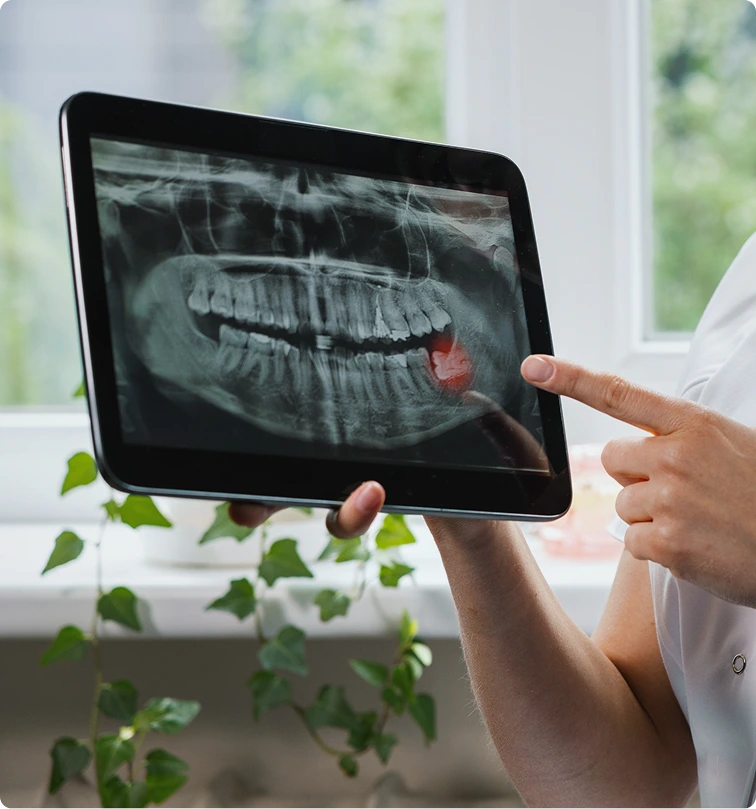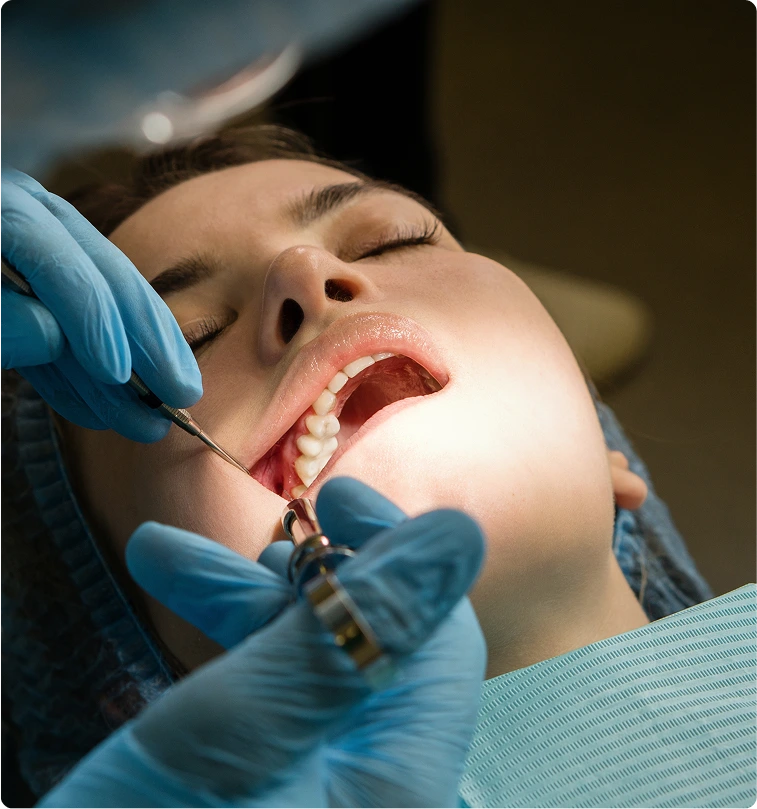Impacted wisdom teeth can lead to persistent pain, swelling, infection, and damage to surrounding teeth, making timely removal an important consideration for many patients. Individuals often seek this procedure to prevent complications, such as overcrowding, cyst formation, or difficulty maintaining proper oral hygiene. Understanding the potential risks and benefits of extraction can help patients feel more confident in their decision, and our skilled oral surgeon, Dr. Nesiba, ensures the process is as safe and comfortable as possible. Cherry Creek Oral Surgery provides comprehensive care tailored to each patient’s needs, guiding them through every step of the wisdom teeth removal process.


Impacted wisdom teeth, also known as third molars, can pose serious oral health risks when they become trapped beneath the gums or jawbone. Because they are difficult to clean properly, impacted third molars increase the likelihood of gum disease and tooth decay, which can affect not only the wisdom teeth themselves but also other teeth nearby. Food and bacteria can accumulate around the partially erupted teeth, often leading to pain, swelling, and a persistent bad taste in the mouth. Addressing impacted wisdom teeth early helps prevent these complications and protects overall oral health.
During your initial consultation, Dr. Nesiba will evaluate both symptomatic and asymptomatic wisdom teeth to determine whether surgical removal is necessary. Even asymptomatic wisdom teeth may require attention if there is enough evidence of potential problems, such as horizontal impaction or vertical impaction. The consultation includes a thorough review of your dental history, imaging, and a discussion of treatment options tailored to your situation. If your wisdom teeth are fully erupted and healthy, we may recommend monitoring them rather than immediate removal, ensuring a plan that prioritizes your long-term oral health.

Depending on the complexity of the extraction and patient comfort, local anesthesia or general anesthesia may be used. Local anesthesia numbs the specific area around the teeth while you remain awake, whereas general anesthesia allows you to be entirely unconscious during the procedure. Dr. Nesiba determines the best approach based on the number of teeth being removed, their position, and your personal medical history.
For partially impacted wisdom teeth or those covered by gum tissue, a small incision is made to access the tooth. This allows Dr. Nesiba to carefully expose the tooth while minimizing trauma to the surrounding soft tissue and adjacent teeth. Proper access ensures that the teeth can be removed safely without damaging nearby structures.
After the procedure, patients spend a short time in our recovery room to ensure the anesthesia wears off safely and vital signs are stable. Our oral surgeon recommends keeping gauze over the extraction socket to control bleeding and encourage the formation of blood clots. Ice packs can be applied to the cheeks to reduce swelling and discomfort. Patients return home the same day to rest and recover.
During the first 24 hours, it is essential to rest and avoid strenuous activity. We recommend eating soft foods and avoiding drinking alcoholic beverages as they can interfere with healing and medications. Maintaining the extraction socket carefully and replacing gauze as directed helps prevent complications and supports proper clot formation.

Candidates for impacted wisdom teeth removal typically include individuals whose developing wisdom teeth are at risk of causing complications. Those with partially erupted wisdom teeth may experience pain, swelling, or difficulty cleaning the area, increasing the risk of infection and gum disease. Patients with developing wisdom teeth, even if asymptomatic, are often evaluated to prevent future problems, such as crowding or damage to adjacent teeth. We recommend removal at a younger age, usually in the late teens to early twenties, when the roots are not fully formed and recovery tends to be faster and easier.
Removing impacted wisdom teeth is a common procedure that addresses potential oral health issues before they become serious. Many patients consider wisdom teeth extraction to protect their overall dental health and maintain comfort in the mouth. Our procedure:
The cost of impacted wisdom teeth removal in Denver, CO, ranges from $300 to $3,000 per tooth, depending on the complexity of the case, the number of teeth being removed, and the type of anesthesia used. Whether the teeth are fully erupted, partially impacted, or trapped beneath the gum tissue can also influence the overall price. Additional considerations include imaging, sedation, and any necessary follow-up care after the surgical procedure.
Insurance coverage may help offset some of the costs, but each plan varies in what it covers. During your consultation, our specialists will evaluate your individual needs, the position of your wisdom teeth, and the recommended surgical procedure. This allows us to provide an exact price and a clear plan for your treatment, ensuring there are no surprises and that you understand all aspects of your care.
Addressing wisdom teeth issues before they lead to complications is a key step in maintaining overall dental wellness. Untreated impacted teeth can contribute to a range of oral health problems, including infections, gum disease, and damage to surrounding teeth. At Cherry Creek Oral Surgery, patients receive personalized care designed to prevent these issues and support long-term oral health. By combining advanced techniques with careful monitoring, our practice helps patients preserve healthy teeth and gums while reducing the risk of future complications.

Removing impacted wisdom teeth can help prevent several oral health issues. Without enough space for the teeth to emerge properly, patients are at a higher risk of developing periodontal disease, damage to nearby teeth, and other dental problems caused by crowding or misalignment. Early removal reduces the risk of these complications and helps maintain a healthier, more stable bite.
Pain is generally well-managed during this procedure. Anesthesia options, including local anesthesia or sedation, ensure that patients remain comfortable throughout the surgery. Some mild discomfort or soreness may be felt afterward, but this is typically manageable with prescribed medications and proper post-operative care.
Removal of impacted wisdom teeth is generally a safe procedure. However, potential complications can occur, especially if there is not enough room for the teeth to emerge properly. Dry socket is one of the more common issues, along with temporary numbness in the lower lip or mouth. Other symptoms may include swelling, bleeding, or infection. Following the preventative measures recommended by your oral surgeon can significantly reduce the risk of long-term complications and promote a smoother recovery.
An oral surgeon typically focuses on surgical procedures in the mouth, such as extractions, dental implants, and minor jaw surgeries. A maxillofacial surgeon, however, has additional training that allows them to treat more complex conditions involving the jaw, face, and skull, including corrective jaw surgery, facial trauma, and reconstructive procedures. Oral and maxillofacial surgeons are specialists trained to handle complex procedures. While many dentists focus on routine care and extractions, oral and maxillofacial surgeons manage surgical cases, such as the removal of the last teeth.